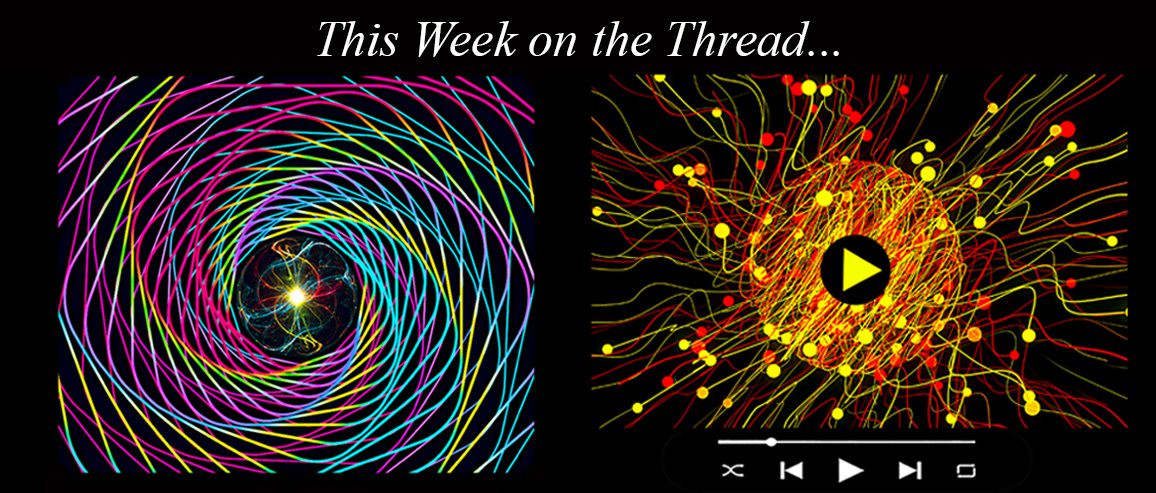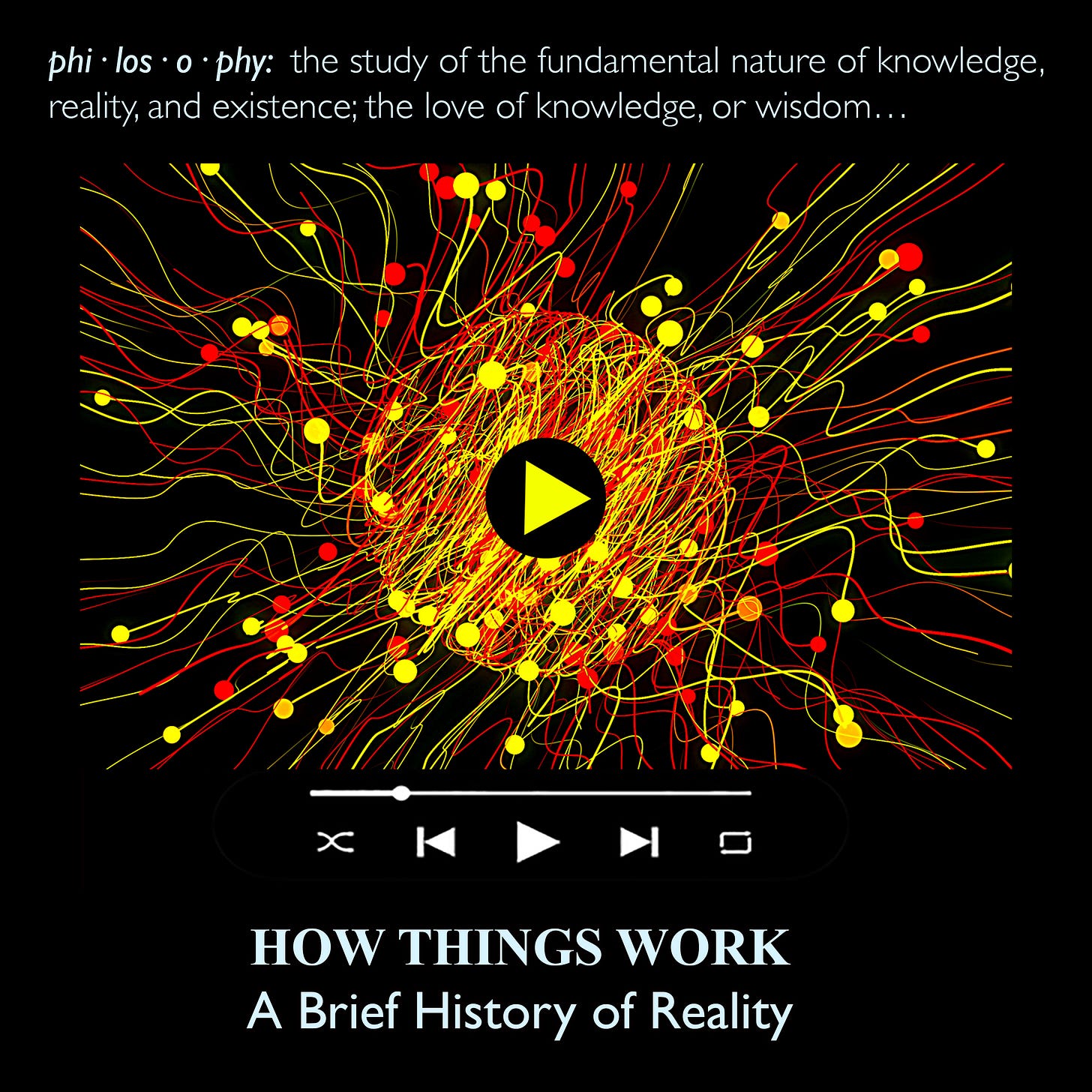Jesus & Nicodemus – Being Born Again
How Things Work – Consideration #134 (Book II Science & Religion)
Be A Part of the Conversation!
Tuesday March 7, 2024
“Now, that’s all very funny language to the modern mind, but it is a commonplace of these spiritual disciplines that what you do in them is die in the midst of life: you are born again a second time. And that death refers to the death of the ego—that is to say, you leave behind the state of consciousness in which you thought you were no more than an isolated individual center of consciousness…”
– Alan Watts
PREFACE
Welcome Everybody!
The history of Christianity is a history of irony, and for many, divine irony.
Jesus, a poor carpenter, preached what he called “the good news” regarding the “Kingdom of Heaven” to the common people. The essence of his message centered around love, faith, forgiveness, and a personal relationship with God. He is condemned by the religious authority of Israel and executed by the political authority of Rome.
“The power and authority of the Roman Empire merges with the new Christian faith to create the first highly structured ‘institutionalized’ religion…”
After the death of Jesus, both authorities persecute the new sect of Christians in an attempt to eliminate them completely. However, after a miraculous conversion by Constantine in 312 CE, Rome itself converts from paganism to Christianity. The power and authority of the Roman Empire merges with the new Christian faith to create the first highly structured “institutionalized” religion: The Roman Catholic Church.
The greatest irony is that the same kind of power structure that enabled the “new faith” to expand its power and influence in the world was also the same kind of power structure that Jesus objected to during his earthly ministry.
“At one time, simply possessing a copy of the Bible was grounds for execution…”
The Roman Catholic Church, much like the leaders of Israel during Jesus’ time, became a power structure designed to control its adherents, as opposed to leading them to spiritual understanding. Just as the Sanhedrin had condemned Jesus to death, the Roman Catholic Church condemned thousands to brutal torture and execution. At one time, simply possessing a copy of the Bible was grounds for execution; only the Church had the power and authority to read and interpret “scripture.”
However, the power of the Church and “its” teachings were questioned during the Enlightenment and began to completely unravel with the birth of the United States of America. The First Amendment in the Bill of Rights of the new Constitution guaranteed its citizens “the right” to religious freedom.
“in America anyone could own, read, come to their own conclusion, and openly talk about what the Bible meant…”
In America anyone could own, read, come to their own conclusion, and openly talk about what the Bible meant, from their own perspective. This allowed them to question the authority of both Catholicism and Protestantism leading to a plethora of new Christian sects in America; thereby shifting the focus of Christianity from theology and dogma to individual understanding and a personal relationship with God.
In Catholicism the miracle of Jesus’ message is manifested through the ritual known as the Eucharist; in the new American Christianity it is manifested through an individual transformation known as “being born again.” In Catholicism, the spiritual mystery of Christiantity is manifested through ritual; in American Christianity, the mystery is directly and individually revealed through a direct existential experience.
Like the concept of the logos, the concept of being “born again” is only considered in the Gospel of John.
CONSIDERATION: Jesus and Nicodemus – Being Born Again
Another story found only in John, is the source for the Christian concept of being “born again.” Here, Jesus talks to a Pharisee who can see that Jesus is a righteous man. However, he is having a difficult time understanding what Jesus is trying to say. Therefore, he sincerely asks Jesus questions, that he might better understand what Jesus means.
Now there was a Pharisee, a man named Nicodemus who was a member of the Jewish ruling council. He came to Jesus at night and said, “Rabbi, we know that you are a teacher who has come from God. For no one could perform the signs you are doing if God were not with him.”
Jesus replied, “Very truly I tell you, no one can see the kingdom of God unless they are born again.”
“How can someone be born when they are old?” Nicodemus asked. “Surely they cannot enter a second time into their mother’s womb to be born!”
Jesus answered, “Very truly I tell you, no one can enter the kingdom of God unless they are born of water and the Spirit. Flesh gives birth to flesh, but the Spirit gives birth to spirit. You should not be surprised at my saying, ‘You must be born again.’ The wind blows wherever it pleases. You hear its sound, but you cannot tell where it comes from or where it is going. So it is with everyone born of the Spirit.”
“How can this be?” Nicodemus asked.
What Jesus reveals to Nicodemus would become the quintessential element of the Christian message for most non-Catholic and non-Protestant Christians: culminating in John 3:16.
“You are Israel’s teacher,” said Jesus, “and do you not understand these things? Very truly I tell you, we speak of what we know, and we testify to what we have seen, but still you people do not accept our testimony. I have spoken to you of earthly things and you do not believe; how then will you believe if I speak of heavenly things? No one has ever gone into heaven except the one who came from heaven—the Son of Man. Just as Moses lifted up the snake in the wilderness, so the Son of Man must be lifted up, that everyone who believes may have eternal life in him.
For God so loved the world that he gave his one and only Son, that whoever believes in him shall not perish but have eternal life. (John 3:16) For God did not send his Son into the world to condemn the world, but to save the world through him. Whoever believes in him is not condemned, but whoever does not believe stands condemned already because they have not believed in the name of God’s one and only Son.
This is the verdict: Light has come into the world, but people loved darkness instead of light because their deeds were evil. Everyone who does evil hates the light, and will not come into the light for fear that their deeds will be exposed. But whoever lives by the truth comes into the light, so that it may be seen plainly that what they have done has been done in the sight of God.”
John 3:1-21
Jesus invites Nicodemus to “give up his current life” and follow him into the Kingdom of Heaven. But the gravity of his own life prevents Nicodemus from giving it up to follow Jesus. He was not ready to be “born again.”
Nicodemus was one of only two members of the Sanhedrin who voted against condemning Jesus at the council. However, he missed the opportunity for a direct personal understanding and relationship with God; something he had sought his entire life. Being “born again” requires giving up your “old self.” The ultimate, and essential, spiritual sacrifice.
POSTSCRIPT
Unlike the other Pharisees, Nicodemus recognizes that Jesus is something unique and special. In his personal conversation with Jesus, Jesus reveals the deeper meaning behind his teachings and parables, their spiritual meaning. Which is the essence of John’s gospel.
There is a distinction between the rational (spiritual) and physical (empirical) worlds. You cannot fully understand how the spiritual world works while embracing how the physical world works. Jesus is amazed how much Nicodemus does not understand this, given that he is a spiritual leader of Israel.
“The rational truth of the spirit is not as constant and unwavering as the empirical truth of the Law…”
Jesus explains to Nicodemus that understanding the spiritual world is not about condemning the physical world; it is about illuminating the truth about how things work at the fundamental level of reality. Jesus is the “light” that illuminates, or, reveals that truth, the Logos. The rational truth of the spirit is not as constant and unwavering as the empirical truth of the Law responsible for social justice, “You hear its sound, but you cannot tell where it comes from or where it is going.”
Nicodemus had become attached to the predictable and dependable illusion of his “empirical self” and could not give it up, despite his desire to understand more about the ambivalent and uncertain world of the spirit. The weight of his long-held tradition had become impossible to let go of. Like Judaism, and virtually any other powerful influence, once Christianity became the dominant power and tradition its focus also shifted from spiritual understanding to controlling and “weighing down” its adherents.
“This new Christianity no longer needed the authority of a Pope or the Church for salvation…”
American Christianity rejected the theology, dogma, and ritual of the past for a more personal relationship with God based on individual understanding and revelation. This new Christianity no longer needed the authority of a Pope or the Church for salvation; the Holy Spirit would reveal the truth directly to the individual, and they would be immediately spiritually transformed; born again. The natural consequence resulting from a direct personal experience with the Logos.
Next week we consider John’s emphasis on the importance of love…
Expand the Conversation by Upgrading to “Reality by a Thread!”
Excerpt From This Week’s “Untangling the Knots of Reality” Podcast:
• UNTANGLING THE KNOTS OF REALITY: Podcast #94 – “Untangling E=mc2 – Part One”
“How did Einstein unravel the Cartesian thread of a certain reality?” “What was the secret behind Einstein’s ability to imagine new possibilities?” “What does E=mc2 actually mean?” “How did this scientific expression of energy and matter transform our understanding of reality” “How does Einstein represent a turning point in scientific thinking about reality?” These are some of the knots we will attempt to untangle in this week’s podcast. That’s a lot of energy and matter for one podcast! So, let’s get started…
• REALITY BY A THREAD: “Artificial Intelligence Axiom #2” (Excerpt) – “Human consciousness, or intelligence, is obsessed with manifesting rational concepts into empirical reality. We are driven to make our thoughts and ideas tangible, or real. We have an idea that human beings can fly; and we eventually invent ‘flying machines’ to carry us beyond the limits of earth. We believe there are invisible worlds too small for us to see; and we invent the microscope to see them. We want to communicate with each other; so, we invent language. It is a natural human tendency, instinct, or drive. This also includes our ideas about God.”
•FREE PDF DOWNLOADS of Book IV: “The Cosmic Symphony – Overtones of String Theory” plus other Free Books, Discounts and Benefits. Also Gain Complete Access to all Previous Podcasts and Threads!
UPGRADE NOW!
“We often think we understand Einstein until we actually and stop and think about what he said. We understand that time and space are relative, partially because we utilize this understanding in space travel. However, what Einstein really says is that the entire universe is relative. We still tend to believe that at some level if we eliminate time that space would still remain; and the objects filling it like suns, planets, and galaxies. However, according to Einstein, eliminating time also eliminates space and all objects related to it.”
(Untangling the Knots of Reality: Podcast #93)






